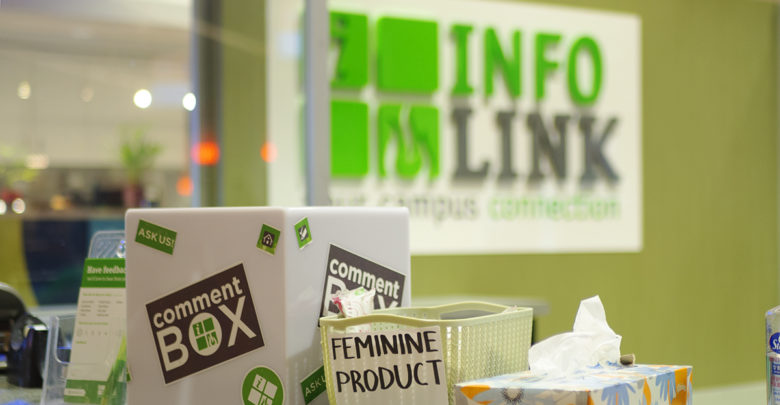Free menstrual products available on campus from Students’ Union
Available at InfoLink locations and some faculty association offices, the idea came from UASU President Akanksha Bhatnagar
 Helen Zhang
Helen ZhangThe Students’ Union has introduced free menstrual products available at InfoLink locations across campus.
Tampons and pads are located in baskets on counters of InfoLink booths, as well as at various faculty association offices. The program started on September 4 by the Students’ Union to allow students access to menstrual products when they need them, and are available for students to take as many as necessary without having to ask for them.
Akanksha Bhatnagar, president of the Students’ Union, included introducing free menstrual products in her presidential platform last year. She said the idea came from various sources, but thinks back to a time in her second year when she was not able to access menstrual products when she needed them.
“A lot of women go through these problems all the time,” she said. “I don’t necessarily think it’s a unique idea. I think I’m in a really unique position as president of the SU to be able to finally roll this out to campus.”
The baskets are placed on InfoLink counters so students are able to take as many products as they like without necessarily having to interact with anyone at the InfoLink station.
“We’re just really trying to make it as accessible for any type of student that needs to grab them,” she added.
Bhatnagar said there are approximately 18,500 students who are femme-identifying in the SU membership, as well as about 2,500 faculty and staff, meaning there are potentially about 21,000 people who would access these free products.
So far, tampons and pads are available, but Bhatnagar said the Students’ Union have been exploring if there is the possibility of collaborating with products such as DivaCup in the future. However, DivaCups are more expensive, she added.
The cost of starting the program came from project money every SU executive gets, she said, adding that the cost is “very minimal.” Ideally, she said, they would like to work with a sponsor or the university to provide menstrual products and get menstrual product dispensers around campus. Bhatnagar said they are meeting with a sponsor this week to discuss a collaboration. For a sponsorship, Bhatnagar said the SU would be looking to find a sponsor who would support a small amount of the products the SU would provide.
“We just want to make sure that students that have the need to access these products can,” she said.
Bhatnagar said the feedback they’ve gotten says students are using the free products and the stations have had to replenish quickly. Faculty associations have also reported usage in their spaces as well, she said. The anecdotal feedback says students are taking more than one product, and that they are happy they don’t have to talk to anyone to use the service, she said. There are also a lot of students asking InfoLink staff about the products, she said, asking what they are and who started the initiative. There will be an intentional feedback solicitation process in the next couple months, she added.
Students react positively to the program
Deeanna, a third-year medical laboratory science student, said she thinks the program is “great.”
“I think [the program] is great,” she said. “[It] should have been implemented a while ago. It’s great that those products are available to women who maybe can’t afford it, and it’s easily accessible.”
Aurora Lapointe, a second-year animal health student, said when she first saw the service, she was relieved and mentioned how people would ask for menstrual products from others in the bathroom.
“I think it’s really great, because they don’t have the machines, I’m pretty sure, in most of the bathrooms, so when you really need to [use them], it’s available,” she said. “Not everyone has the time to run to the pharmacy or something—since they don’t sell them other places—to grab them.”
Bhatnagar says it was an “important” platform promise for her
As there are not many women in executive leadership positions, Bhatnagar said it was important to include free menstrual products in her presidential platform because it was a project that is important to her, and others of the same gender. She added it is important to talk about periods, and not to “shy away” from the discomfort surrounding them.
“The more open you are about the products, and the more open you are about talking about things like your period, there’s less stigma around the fact that women bleed.” she said.
There are no plans to expand the program, she said, but if other spaces on campus would like to offer free menstrual products, she would be “happy” to offer them.
“If other offices around campus or other student group offices want a basket with products, we’d be more than happy to give them the products, give them the baskets. They would be of no cost to them and I’d be happy to deliver,” she said.




